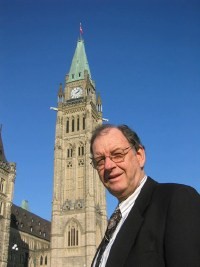And, in order to see that his legislation made it through the Senate, once they passed the House of Commons, he worked with Conservative Senator Hugh Segal. (Segal’s introductory words in his 2006 autobiography should not be forgotten, in recognizing the significance of that McKay-Segal linkage. In The Long Road Back: The Conservative Journey, 1993-2006 (Harper-Collins, 2006), Segal supplies a poignant commentary on the effect of his youthful orthodox Jewish background, on his discovery of both community and conservatism.)
* * *
Besides Segal, the “other player” I would like to mention is Liberal Senator David Smith. Readers of OttawaWatch will recall my periodic references to Smith and his close family ties to the Canadian evangelical community.
Smith, in his younger years, was a Trudeau cabinet minister and apparently helped persuade his boss to include a reference to God in the preamble to the constitution. Later, during Jean Chretien’s tenure, he played a key role in building Liberal strength, federally, particularly in Ontario. Keep in mind that, during those years, the Liberals were electing over 100 MPs from Ontario. That figure has dropped to just over one-third of that total, during the Conservative resurgence.
Smith, a Baptist himself, has retained close contact with the Pentecostal community from which he was sprung. (Both his late father, C.B. Smith and his brothers, Robert and George, were/are outstanding Pentecostal leaders.)
That religio-political astuteness stood him in good stead in helping evangelicals to feel comfortable with the liberal political culture, particularly in Ontario. The lack of success of the Liberals in the west likely had something to do with the fact that the party could not penetrate the evangelical culture west of the Ontario-Manitoba border.
* * *
McKay, it would appear, if Brian Lilley has things well-pegged, could be Smith’s de facto successor in the effort to attract evangelical votes to the Liberals, particularly in Ontario.
But his success in that area is not a “done deal”. Rather, there are some other interesting options, one of which is being test-driven at the moment. It involves the concept of political realignment and involves the way in which the Liberals are relating to the Conservatives, in getting the budget passed.
That means that McKay’s success could come in a different area and could involve “redefining victory”, to adapt and paraphrase some of Prime Minister Stephen Harper’s recent comments about Canada, Afghanistan and the Taliban.
* * *
Lloyd Mackey is a member of the Canadian Parliamentary Press Gallery in Ottawa and author of Stephen Harper: The Case for Collaborative Governance (ECW Press, 2006), More Faithful Than We Think: Stories and Insights on Canadian Leaders Doing Politics Christianly (BayRidge Books, 2005) and Like Father, Like Son: Ernest Manning and Preston Manning (ECW Press, 1997). Lloyd can be reached at lmackey@canadianchristianity.com.
